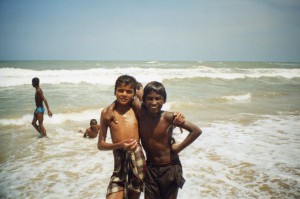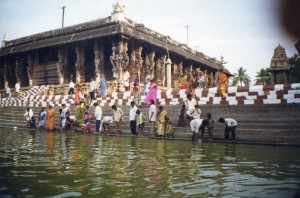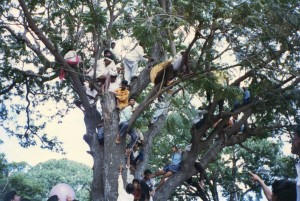People joke that Chennai has three seasons: hot, hotter and hottest.
But in early December, the monsoon roared in. Sheets of rain slammed the dorm walls and wind ripped panels off the main hall. The water quickly rose to the middle of my thighs.
It felt so good to wade in its cool caresses until a groundskeeper warned me about poisonous snakes. Everyone finally had to evacuate to an apartment building on higher ground.
When the rain subsided, three other Americans and I walked to the main road. We felt giddy after being cooped up, so we decided to ride into town for dinner.
The area was now cleaned from the grime that normally gives the off-white buildings dark brown frames around the edges. A dead cow sprawled by the roadside, and a lone baby goat frantically called for its mother. But the water drops on the trees and bushes sparkled under the triumphant sun. The area looked fresh. Nature’s cycles in this timeless land had turned. The old passed away and life was renewed.
I spotted my regular auto rickshaw driver, Surya. He was yakking with a few other drivers, and one of my companions said in an Alabama drawl, “Hey! Surya’s drunk!”
When Surya realized what we were laughing about, he exclaimed, “No! No! Surya no like drinks! Surya clear! But today, fight with wife and I’m having some feelings.”
We threw caution to the wind and insisted that he drive us anyway–auto rickshaws don’t go very fast. Surya sang and we helped him drive–“Here comes a bus, Surya.” We had a lot of laughs that evening.
Emotional patterns in India often reflect the abundance in nature. You feel fully, and express your feelings without reserve.
Traditional Indian drama and painting are based on the concept of rasa, which is a universal emotion that you become absorbed in. What a different idea of emotion than the balance that Plato and Aristotle emphasized. But this larger-than-life land encourages different ways of feeling things than Greece’s clear boundaries between coast and shores, and between valleys and mountains. Many of the ways Indians and Westerners feel and think have very deep roots.
To see more of what made India’s origins unique, see:
Life in Traditional India Part One, and
The Rg Veda, Roots of Indian Culture; Part One.




Comments on this entry are closed.